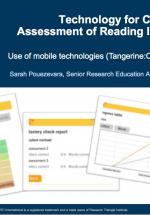Digital Assessment and Data Collection
RTI International wins 2018 Digital Edge 50 award for education tool

RTI International has been honored with a 2018 Digital Edge 50 Award for being a leader in digital innovation. The prestigious award recognizes a new open-source tool recently developed by RTI to measure executive function (EF) skills in pre-school aged children The tool, EF Touch, is administered using Tangerine®, RTI’s open source software that was designed to transform the way teachers, coaches and researchers assess and observe literacy and numeracy teaching and learning.
Using ICT to support evidence-informed instruction [Presentation]

This presentation was delivered by Wendi Ralaingita at the Open Learning Exchange (OLE) conference in Kathmandu, Nepal (November 2017). It provides an overview of RTI's evidence-based approach to ICT integration, based largely on the Improvement Science literature, particularly Edward Deming. Describes uses of Tangerine open-source software for teacher coaching (Tangerine:Tutor) and classroom continuous assessment (Tangerine:Class) as well as hearing and vision screening tools integrated with EGRA and EGMA assessments.
Technology for Continuous Assessment of Reading Instruction

This is a presentation about Tangerine:Class, which was delivered at the 2016 Pacific Circle Consortium in Saipan.
CIES 2017 Presentation: Measurement of early reading under the SDGs

Measurement of learning is central to the Sustainable Development Goals for education, both in early primary (grade 2/3) and in early childhood (under the age of 5) (IAEG 2016). Of particular concern is the ability of global measurement approaches to reflect the social and linguistic differences of a diverse range of societies, including traditionally marginalized groups. This presentation relies on literacy assessment data to answer the following question: can results from non-equated national assessments be used to report against global goals?
The Early Grade Reading Assessment: From Design to Dissemination

An infographic describing the key steps and timeline involved in conducting an Early Grade Reading Assessment (EGRA).
Nigeria Education Data Survey (NEDS) 2010 State Report: Anambra

The 2010 Nigeria Education Data Survey (NEDS) was a nationally representative sample survey implemented primarily by the National Population Commission (NPC) in collaboration with the Federal Ministry Of Education (FMOE) and the Universal Basic Education Commission (UBEC).
The 2010 NEDS has the following specific objectives:
Provide data on the schooling status of Nigerian children of basic education age, including factors influencing whether children ever enroll in school and why students drop out of school
Quantify household expenditures on children’s schooling by examining different patterns of expenditure by various background characteristics Measure parents’ attitudes to schooling, including the quality of schooling and provide an understanding of attitudes that shape their willingness to send their children to school
Measure the frequency of student absenteeism and reasons for missing school in order to suggest possible approaches to maximizing attendance
Provide data that allows for trend analysis and State comparisons
A very high overall response rate of 98% was achieved with interviews completed in 26,934 households.
